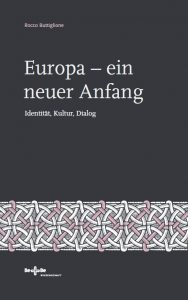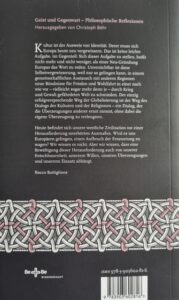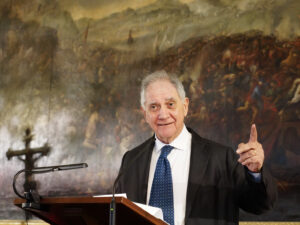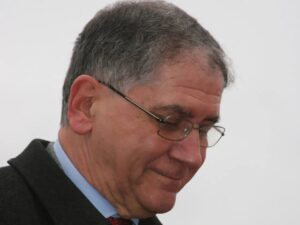Buchtipp
Rocco Buttiglione
Europa – ein neuer Anfang
Identität, Kultur, Dialog. Reihe Geist und Gegenwart
 Rocco Buttiglione
Rocco Buttiglione
Europa – ein neuer Anfang
2023
Be+Be-Verlag, Heiligenkreuz im Wienerwald
167 Seiten / Softcover
ISBN 978-3-903602-81-6
21,90 Euro
 Kultur ist der Ausweis von Identität. Derer muss sich Europa heute neu vergewissern. Das ist keine leichte Aufgabe, im Gegenteil: Sich dieser Aufgabe zu stellen, heißt nicht mehr und nicht weniger, als einer Neu-Gründung Europas das Wort zu reden. Unverzichtbar ist diese Selbstvergewisserung, weil nur so gelingen kann, in einem gemeinschaftlichen Austausch mit anderen Regionen neue Bündnisse für Frieden und Wohlfahrt in einer nach wie vor – vielleicht sogar mehr denn je – durch Krieg und Gewalt gefährdeten Welt zu schmieden. Der einzig erfolgversprechende Weg der Globalisierung ist der Weg des Dialogs der Kulturen und der Religionen – ein Dialog, der die Überzeugungen anderer ernst nimmt, ohne dabei die eigene Überzeugung zu verleugnen.
Kultur ist der Ausweis von Identität. Derer muss sich Europa heute neu vergewissern. Das ist keine leichte Aufgabe, im Gegenteil: Sich dieser Aufgabe zu stellen, heißt nicht mehr und nicht weniger, als einer Neu-Gründung Europas das Wort zu reden. Unverzichtbar ist diese Selbstvergewisserung, weil nur so gelingen kann, in einem gemeinschaftlichen Austausch mit anderen Regionen neue Bündnisse für Frieden und Wohlfahrt in einer nach wie vor – vielleicht sogar mehr denn je – durch Krieg und Gewalt gefährdeten Welt zu schmieden. Der einzig erfolgversprechende Weg der Globalisierung ist der Weg des Dialogs der Kulturen und der Religionen – ein Dialog, der die Überzeugungen anderer ernst nimmt, ohne dabei die eigene Überzeugung zu verleugnen.
Heute befindet sich unsere westliche Zivilisation vor einer Herausforderung unerhörten Ausmaßes. Wird es uns Europäern gelingen, einen Aufbruch der Erneuerung zu wagen? Wir wissen es nicht. Aber wir wissen, dass eine Bewältigung dieser Herausforderung auch von unserer Entschlossenheit, unserem Willen, unseren Überzeugungen und unserem Einsatz abhängt.
Be&Be Verlag: Europa – ein neuer Anfang
Amazon: Europa – ein neuer Anfang
In der Tagespost ist diese Buchbeschreibung erschienen:
Europa, ein neuer Anfang
Rocco Buttiglione

Rocco Buttigliones neues Buch ist ein flammender Appell an sein Europa, um dessen Zukunft der Philosoph und Politiker fürchtet.
Die europäische Integration, in den Jahren des Wiederaufbaus nach dem Zweiten Weltkrieg in Gang gesetzt, ist ein gleichermaßen erfreuliches wie auch erfolgreiches politisches Projekt, das in der Geschichte seinesgleichen sucht. Über 70 Jahre dauert dieses Einigungswerk nun.
Es hat nicht nur manche Krisen überstanden.
Es ist auch gewaltig territorial gewachsen und hat in der Europäischen Union ein einzigartiges Ausmaß und Komplexität an gemeinsamer Rechtsordnung, gemeinsamen Institutionen der politischen Entscheidungsfindung, der Verwaltung und der Rechtsprechung entwickelt. Man kann hier nicht von einem Bundesstaat sprechen, aber auch die Kategorie des klassischen Bündnisses souveräner Nationalstaaten
wird dem nicht gerecht.
Es ist ein politisches Konstrukt sui generis. Und immer noch klopfen Staaten an die Türe dieses europäischen Hauses, die dazu gehören wollen.
Aber trotz oder gerade vor diesem Hintergrund schreibt der italienische Philosoph, Politiker und Europäer Rocco Buttiglione ein Buch über Europa, in dem er zu solchen Feststellungen kommt: „Wir haben ein Bündnis der freien Marktwirtschaft mit den Erfordernissen der Solidarität verfehlt.“ (Seite 108); „Statt dieWeltökonomie gemeinsam und miteinander zu regeln, haben wir schon begonnen, uns für den Krieg vorzubereiten. (Seite 113); „Was uns hingegen fehlt, ist eine Vision von Gemeinwohl: Die nämlich haben wir nicht, weder als Volk, noch in Europa, noch für die Menschheit. (Seite 121)
Buttigliones Buch ist ein komprimierter flammender Appell, den der Philosoph und Politiker an sein Europa richtet, um dessen Zukunft er fürchtet. Buttigliones brennende Sorge ist, dass die Europäer über alle ihre großen wirtschaftlichen und politischen Erfolge die kulturellen Grundlagen ihres Einigungswerkes vergessen oder gar abgestoßen haben.
Eben diese Grundlagen waren denen, die als führende Politiker das Einigungswerk begonnen hatten, Ausgangspunkt und Triebfeder ihres Handelns. Sie wussten, dass es einer gemeinsamen kulturellen Grundlage bedarf, um Grenzen, Antagonismen, Interessenkonflikte zu überwinden und gemeinsame europäische Institutionen überhaupt handlungsfähig zu machen.
Woran kann es liegen, wenn Buttiglione diagnostiziert, dass Europa seine kulturellen Grundlagen aus dem Blick verliert? Ein Grund mag sein, dass das Einigungswerk unter den obwaltenden politischen Möglichkeiten ganz auf die wirtschaftliche Integration konzentriert ist: Montanunion,
Wirtschaftsgemeinschaft, Binnenmarkt, Währungsunion. Das einzige Projekt aber, das die Europäer als Schicksalsgemeinschaft auf Leben und Tod aneinander gebunden und so einen Kern an gemeinsamer Identität erfordert hätte, die Europäische Verteidigungsgemeinschaft, scheiterte.
Buttiglione sieht aber vor allemeinen originär kulturellen Wandel in Europa. Es ist die zumindest partielle Abwendung von seinen kulturellen Wurzeln und die Hinwendung zu einem extremen Individualismus, der nur die individuelle Freiheit im Blick hat, aber die Verpflichtungen gegenüber anderen, die originären Ansprüche gemeinschaftlicher Institutionen verleugnet. Diese werden mit der Rechtfertigung der Antidiskriminierung außer Kraft gesetzt. Das betrifft etwa die Familie, die Elternrechte.
Eine schon extreme Ausformung erfährt dieses Denken zum Zeitpunkt der Niederschrift dieses Textes mit dem in Deutschland in den Bundestag eingebrachten Gesetz, wonach pubertierende Jugendliche gegen das Votum der Eltern und ohne Beratung die Bestimmung ihres Geschlechtes selbst wählen können. Dies ist nicht nur eine Quelle des Konfliktes mit den neuen mitteleuropäischen EU-Mitgliedern, die dieses Denken ablehnen. Die Ausblendung der Verpflichtungen gegenüber Gemeinschaftsinstitutionen entzieht auch der notwendigen Solidarität unter den EU-Mitgliedsländern die geistige Grundlage.
Die Konstituierung eines europäischen Volkes
Nach Buttiglione hat Europa eine große Chance vergeben, als der angestrebte Verfassungsvertrag von 2004 an den Referenden in Frankreich und den Niederlanden scheiterte. Dieser Vertrag sollte nicht nur die Europäische Union an ihre kulturellen Wurzeln binden, sondern auch Maßstäbe für die Ordnung ihrer Institutionen festlegen. Rocco Buttiglione fasst den Zustand Europas, der daraus und dem ersatzweise geschlossenen Vertrag von Lissabon entstanden ist, in das Bild eines Hauses, dem bei fast vollständiger Inneneinrichtung das Dach fehlt, und das deshalb demdrohenden Verfall preisgegeben ist (Seite 34). Deutlich beklagt Buttiglione die Weigerung, die christliche Religion als eine entscheidende Wurzel der europäischen Kultur anzuerkennen.
Er stellt klar, dass keinesfalls ein konfessioneller Anspruch erhoben wird. Vielmehr geht es um die kulturelle Prägung, die diese Religion in Verbindung mit der klassischen Philosophie und der Aufklärung geschaffen hat. Buttiglione bringt dieses Amalgam auf eine einprägsame Formel: „Ist Jesus nur ein Philosoph, ein jüdischer Sokrates? Oder ist Sokrates zu verstehen als Johannes der Täufer der Heiden, ein Vorläufer des Sohnes Gottes? (Seite 47). So oder so, klar ist: „Jene aber, die weder Christus noch Sokrates kennen, sind keine Europäer mehr.
Mit seinem Appell an die gemeinsame europäische Kultur hat Buttiglione etwas politisch und historisch Fundamentales im Sinn. Es geht ihm um die Konstituierung eines europäischen Volkes im Sinne des klassischen griechischenDemos. Im Widerspruch zu Ralf Dahrendorf und Roger Scruton, für die die Europäer kein Volk sind, verweist er auf die klassischen Vorbilder Athen und Rom. „Die attischen Sippen sind ein demos geworden, weil sie es so gewollt und sich zu einer gemeinsamen kulturellen Gemeinschaft bekannt haben. (Seite 52) Und er erinnert an einWort von JeanMonnet, der sagte, sollte er das europäische Projekt noch einmal von Anfang an und erneut beginnen können – er mit der Kultur beginnen würde.
Da muss man Buttiglione Recht geben: Das europäische Einigungswerk ist an einemPunkt gelangt, wo es, trotz allem, was in langen Jahren aufgebaut wurde, in sich zerfallen kann, oder es muss den entscheidenden Schritt tun, aus den Europäern ein Volk imklassischen kulturellen Sinn zumachen. Das ebnet Vielfalt nicht ein und muss nicht in das Modell eines Bundesstaates münden. Aber Kernfragen ihrer Existenz können die Europäer nur noch gemeinsam lösen oder sie lösen sie nicht. Buttiglione beschreibt existenzielle Fragen, die Europa gemeinsam lösen muss, so die Mitgestaltung einer Ordnung des Zusammenlebens in der fortschreitenden Globalisierung der Lebensverhältnisse, die Nachbarschaftsund Einwanderungspolitik mit besonderer Beachtung Afrikas, eine Sicherheitsordnung, die auf Dauer auch Russland einschließt. An diesen Beschreibungen mag man über Einzelheiten streiten. Die Themen sind zutreffend dargestellt.
An dieser Stelle sei klargestellt, dass mit europäischer Kultur oder Identität keinesfalls ein Kanon fest nach außen abgrenzender, gar ideologischer Dogmen verbunden ist. So hat etwa R´emi Brague zur europäischen Kultur Bemerkenswertes und Erhellendes unter dem Stichwort „exzentrische Identität und römische Sekundarität gerade mit Blick auf Christentum, griechische und römische Antike geschrieben. Die Lernbereitschaft und die Lernfähigkeit, kulturelle Errungenschaften auch von außen zu prüfen und fruchtbar umzusetzen, zeichnet die europäische Kultur aus.
Genauso grenzt auch Buttiglione sein Bild der europäischen Kultur von Ideologien ab und beschwört dagegen die freieGestaltungsmöglichkeit der Lebensverhältnisse, die aber ihre Grenzen und ihren Korrekturbedarf kennt. Er kommt zu dem Schluss: „Dadurch beweist der Geist einer Zivilisation seine Vitalität, indem er die Fähigkeit zeigt, neue Lebensformen zu gestalten… Fehlt die Bereitschaft dazu und erweist sich eine Zivilisation als unfähig, sich zu erneuern, muss und wird sie zusammenbrechen.
(Seite 133)
Rocco Buttigliones Warnung muss man ernst nehmen. Für Europa kann es um Sein oder Nichtsein gehen.
Helmut Klapheck
Auf der Seite von The EUROPEAN CONSERVATIVE ist folgende Buchkritik zu finden:
Europa—ein neuer Anfang Identität, Kultur, Dialog
by Rocco Buttiglione
Heiligenkreuz, Austria: Lehmanns, 2023
Enkindling the Desire To Be European
In his new book, Europe: A New Beginning; Identity, Culture, Dialogue, (published in German under the title Europa — ein neuer Anfang; Identität, Kultur, Dialog), Rocco Buttiglione presents his vision for the future of Europe in the midst of crisis and globalization. One image serves to illustrate the core problem: a bridegroom who has lost his bride on the way to the altar and is now desperate to find her. The question is: where is this bride that the groom (a metaphor for the European Union) has lost?
 “Never war in Europe,” was the motto of his youth, recalls Buttiglione. This saying effectively served as his guiding political principle for decades. Yet, once more, war has broken out again in Europe. For Buttiglione, the source of the current European crisis is Europe’s failure to produce a European Constitution based on Christian values. He points specifically to the Treaty of Lisbon, which failed to cover the “edifice of Europe” with a proper “roof.” The events between 1978 and 1989 presented the best opportunity to unify Europe around common cultural values—but it’s a chance that’s in the past, begging the questions of whether European unity can still be recovered.
“Never war in Europe,” was the motto of his youth, recalls Buttiglione. This saying effectively served as his guiding political principle for decades. Yet, once more, war has broken out again in Europe. For Buttiglione, the source of the current European crisis is Europe’s failure to produce a European Constitution based on Christian values. He points specifically to the Treaty of Lisbon, which failed to cover the “edifice of Europe” with a proper “roof.” The events between 1978 and 1989 presented the best opportunity to unify Europe around common cultural values—but it’s a chance that’s in the past, begging the questions of whether European unity can still be recovered.
In the first chapter, Buttiglione recalls the revitalizing efforts of the European project in the last quarter of the 20th century. In the second chapter, he gives an overview of the current crisis, given the continent’s position in world politics. In the third chapter, he illustrates mistakes and failures, missed chances, as well as new possibilities. In the fourth chapter, he proposes a method to interpret history and politics in Europe, as ideologies end and the imminent danger—a consequence of its current, aimless politics—begins.
The main revitalizing efforts of the European projects from 50 years ago arose from a mindset that had two persistent convictions: that the world was divided, and a nuclear war would destroy humanity. The victors of World War II had ceded half of Europe’s countries to the Soviet Union’s totalitarian, Communist bloc. The new dividing lines could only be breached by another war, which would be catastrophic for mankind. This ‘status quo’ was broken unexpectedly by the most unlikely person: Pope John Paul II.
Pope John Paul II embodied the rise of a new Europe. His historic appearance in Poland set the ball rolling in what would eventually lead to the fall of Communism in the West. With his peaceful revolution of conscience and his insistence on truth—totalitarian regimes need the lie to justify themselves—he appealed to the minds and hearts of the Polish people, who peacefully rebelled against their government. And the government caved. John Paul II’s vision for a united Europe became a reality. His vision was clear: to execute a successful project, the West should contribute its experience on how to build an economy that focused on people and states under the rule of law, and the East would contribute its sense of Christian values. “The victory over totalitarianism was a moral and not necessarily a political victory. In this fight, Europe had regained its soul,” writes Buttiglione.
Along with John Paul II, Helmut Kohl and Otto von Habsburg were key figures in the consolidation of Europe: first with the reunification of Germany, then the Paneuropean Union, and specifically the Picnic of Freedom at the Austrian-Hungarian border on August 19th, 1989.
The great failure in the larger context of the battle for a united Europe was the failure to establish a European Constitution that reflected the common roots of European civilization. Christian values failed to become the central foundation upon which Europe ought to have flourished. “Christian values” were not intended to be a confessional creed, but rather the combination of Judeo-Christian anthropology, with input from Roman law, Greek philosophy, and Jewish-Christian revelation. “Those who do not know Jesus nor Socrates, are no longer Europeans,” Buttiglione asserted.
The missing Judeo-Christian dimension enabled illegitimate power grabs from various institutional forces—in other words, the current crisis in Europe came about against the background of Necessitas non habet legem (Latin for ‘in a case of emergency, there is no law’): The financial crisis of 2008 was countered by the European Central Bank, which operated against the European Constitution; COVID-19 and, most recently, the war in Ukraine, have led to a further deterioration of unity and have given rise to a new sense of sovereignty of individual nations against the European Union.
As Buttiglione see it, the deeper problem consists of Europe’s rejection of a common nature as a people, a common identity built on Christianity—to Buttiglione, an exercise of the will by the demos, a condition met by the Greeks, the Romans, and more recently, the Americans. To foster the will, there must be enthusiasm to drive it. Enthusiasm, Buttiglione argues, is always rooted in something blessed since it leads to the sacred. If Europe wants to share a common brotherhood, then it needs to recognize a common father. A common people is based on a common culture and common values.
But John Paul II and Helmut Kohl’s proposal was rejected. “In its place came the Lisbon Treaty—a terrible treaty that did not give us the political unity of Europe, but the Europe of bureaucracy and conflicts of interest. The Europe of rights without obligations had finally triumphed,” comments Buttiglione.
Afurther cause of the current crisis was the ostracisation of Russia from the European project. It is easy today to blame Russia for the disintegration of European unity and the new war. Though Putin assumes the role of the villain by invading Ukraine, he is not the only one to blame for the crisis, and Europe is not completely innocent. By only counting on the expansion of consumerism in society, while failing to live and export European values, the West has focused on an individualism that it imposed on the Eastern European countries. By doing so, it alienated those nations which could have communicated better with Russia.
Russia was abandoned to President Putin. Large companies in Russia were not integrated into the market economy but were privatized by an oligarchy with roots in the former Soviet Union. Corruption, violence, and mafia-like structures have subsequently divided Russian society. The present conflict, according to the author, was born out of the West’s refusal to make Russia a cultural, civilizational offer. Instead, Europe relied on buying cheap gas and oil from Russia thereby financing Putin’s endeavors.
Additionally, Europe today faces the challenge of globalization. Buttiglione understands globalization to be a result of the Marrakesh Agreement of 1994, during which 123 nations established the World Trade Organization. Globalization became a lucrative deal for the rich and the (very) poor. Capital could flow to countries that offered the best environment in which to maximize profit.
The effects of this economic policy was felt in Western countries. Unemployment rose and many suffered lower wages. The victims of these economic shifts felt, and continue to feel, unfairly treated—fueling a new form of populism in the West. In addition, politics lost sovereignty over the economy. Witness what happens when politicians want to raise taxes to finance the welfare state or introduce stricter environmental rules: large corporations can pressure them by threatening to move to other countries with lower wages, taxes, and regulations. Globalization, according to Buttiglione, is here to stay.
According to Buttiglione, if Europe is to find its way in the globalized world, it will need an ethically-oriented policy that is willing to make the preservation of peace in the world its primary goal. This policy is a natural continuation of the social market economy which can be achieved by creating a contemporary revival of the vision of John Maynard Keynes.
This requires two conditions: first, deficit spending must be exclusively investment spending to strengthen the competitiveness and productivity of the economy. Debt incurred in the investment phase must be recouped by a return on that investment. Current expenditures must be financed exclusively by taxes. Second, the stimulus of this Keynesian policy must have a global dimension and be coordinated among the major economic powers. If the policy is global, the effects will also be global. Each economy will share in the expenditures, as well as in the revenues.
Buttiglione admits that this vision requires some kind of global power, although not through a global government, but in “global governance,” in which decisions of great magnitude must be made in consensus among the nations, and, if need be, “sovereignty must be exercised jointly.”
In the midst of the current crisis, Europeans must learn anew to “think politically,” that is, to think beyond the individual and more as members of the political community and a nation centered on the common good.
Modern philosophy has based itself on a scientific method and culminated in the construction of systems, which presented the illusion that human history was predetermined and could be anticipated accordingly. The idea of eternal progress has replaced the idea of God within this current.
Buttiglione writes that if one wishes to revive Christian values in Europe, cultural dialogue is necessary. This would require both the knowledge of one’s own culture and the encounter with other cultures. Only through the (re)discovery of one’s own cultural identity will particularization into smaller groups be avoided. In other words: politics that lose sight of the whole are reduced to a sum of diverse, partial, and sectorial individual claims that can no longer be integrated into a larger project involving common coexistence. Everyone then only regards himself as a member of a special group, which may no longer be interested in striving for general human rights, only special group entitlements. Real cultural exchange and mutual enrichment cease to exist. In turn, when there is no inner cohesion in society, the preconditions of democracy dry up.
“Today, our Western civilization faces a challenge of unheard-of proportions. Will we succeed in renewing ourselves? Will the ‘old’ values be resurrected in a new form? The future is known only to God. But we know that meeting this challenge is also—at least in part—within our freedom, and depends on our determination, our will, our convictions, and our commitment,” Buttiglione concludes.
A Europe without a common identity founded on Christian values is built on sand.
Jan Bentz, native of Germany, teaches Philosophy at Blackfriars, Oxford. He has worked in journalism for over a decade based in Rome, Italy, covering the Vatican. His academic work focuses on Thomistic Metaphysics and Medieval thought in relation to Modernity.
